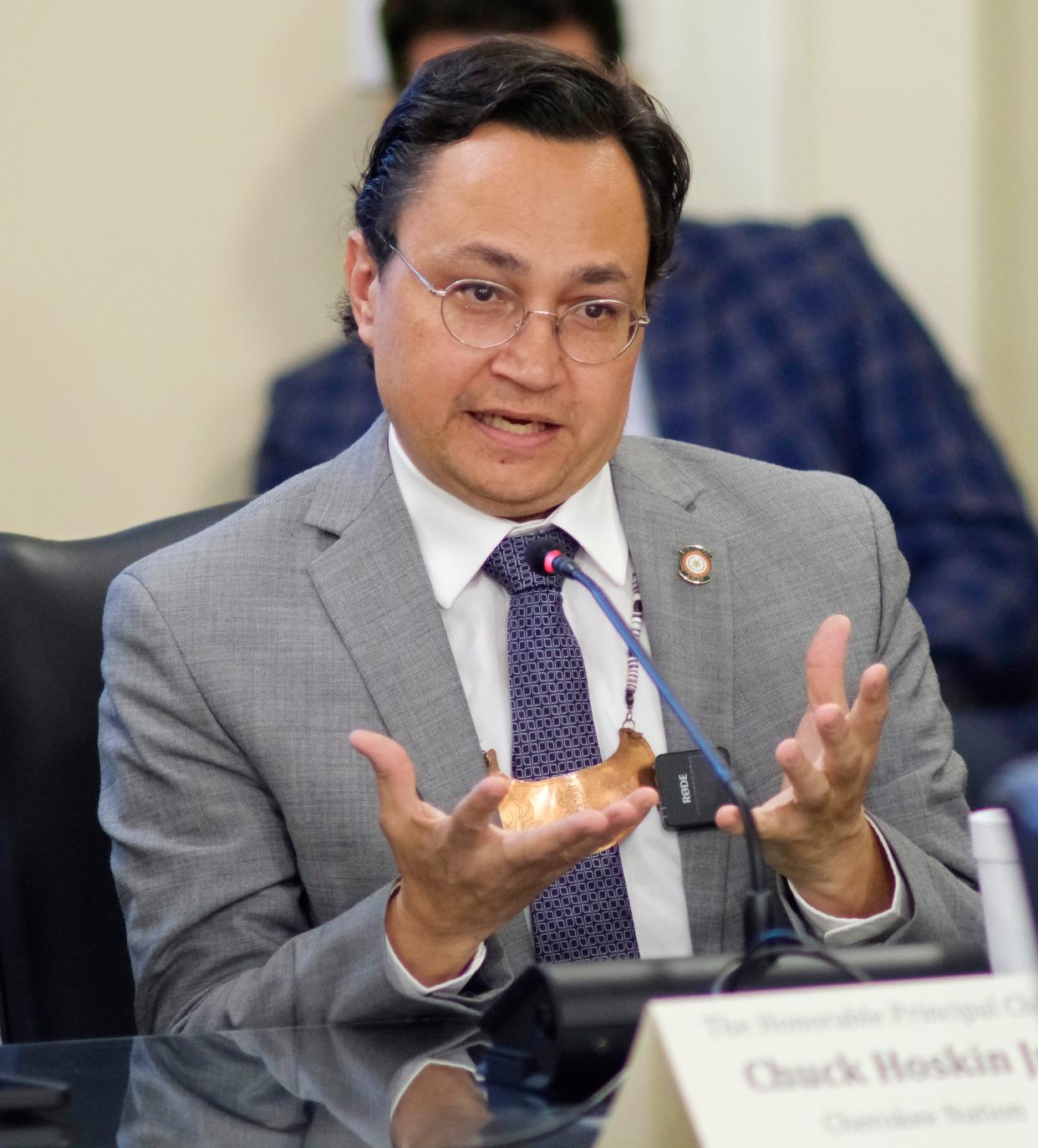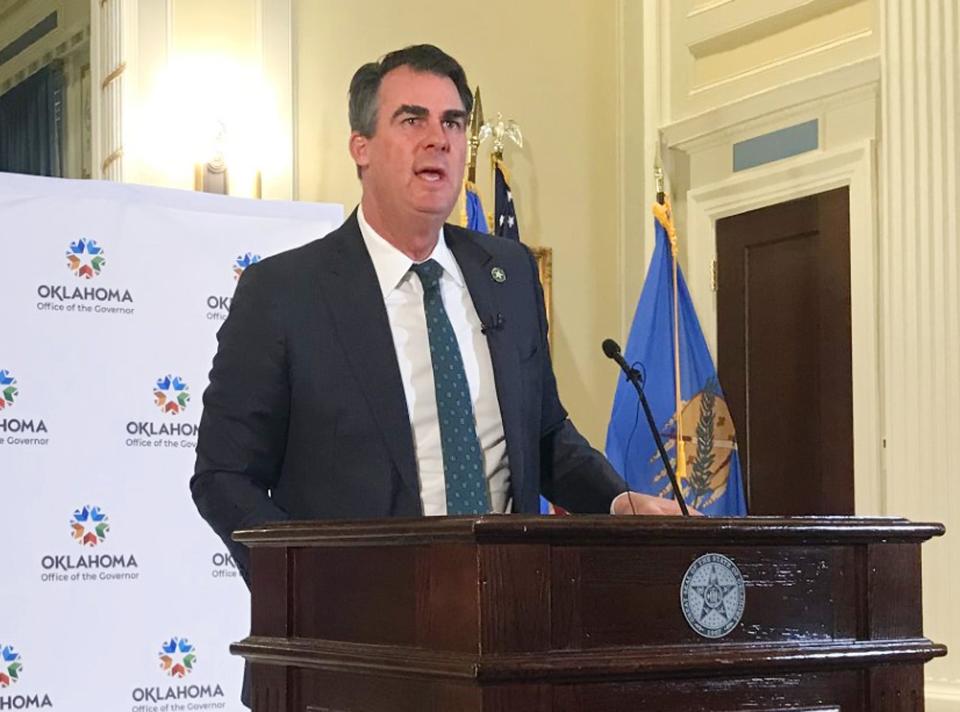Why the future of Oklahoma's car tag compact with the Cherokee Nation is in dispute

- Oops!Something went wrong.Please try again later.
The leader of Oklahoma’s largest tribal nation wants to renew his tribe’s car tag compact with the state without any major changes. But Gov. Kevin Stitt doesn’t appear to be buying in to the proposal promoted by Cherokee Nation Principal Chief Chuck Hoskin Jr.
The one thing both elected officials agree on so far is that their attorneys are negotiating in good faith to draw up a deal that works for everyone. Yet, the clock is ticking before the current compact expires at the end of the year, and the two sides still appear far apart. Stitt and Hoskin have been at odds for more than a year over the compact’s future.
The dispute came back into public light Tuesday, when Hoskin reiterated his support for the existing deal, which lawmakers voted last year to extend through Dec. 31. The tribe operates its own tag agency, issues plates to citizens statewide and splits the money generated from those sales with state and local governments, including public schools.
“There’s nothing to fix on this compact,” Hoskin said, speaking at an event near Tulsa to celebrate the tribe’s latest round of payments to Oklahoma schools, which added up to $7.9 million.
“The only thing we need to do in this state is continue to do what works,” he said, “and this compact works.”
More: Oklahoma governor signs new compacts with tribal nations, here are all the details
Hoskin asked the educators gathered in the room to contact Stitt and express their support for the compact. He said he may soon ask for help from state lawmakers if no progress is made. The Legislature adjourns in May, adding extra urgency, from Hoskin’s perspective, to renew the compact within days or weeks.
“We would need to be acting quickly on legislative action,” he told The Oklahoman by phone after the event.
What the Cherokee tribal tag compact could look like
Abegail Cave, a spokesperson for the governor, did not disclose exactly where compact negotiations stood. But in an email, she described a different type of state-tribal agreement — where the state issues license plates instead of the tribe — as a “better deal for both the state and the tribes.”
She said that arrangement, similar to the state’s compacts with the Chickasaw and Choctaw nations, would provide the state “complete transparency.” Oklahoma issues plates directly to the citizens of those tribes, and Service Oklahoma maintains that tag and registration information.
“Under the Cherokee compact, the Cherokee government runs its own tag agencies and is supposed to submit driver information to the state of Oklahoma, though the state has no mechanism to audit that information or confirm that it is getting complete, accurate and up-to-date information,” Cave said.
She noted the state’s new toll pass readers on turnpikes cannot read Cherokee plates, repeating the governor's long-standing criticism.
Hoskin called the situation a “problem of the state’s own creation” that should be separate from compact talks. He said state officials failed to ensure the readers could access tribal tag data before they powered on.

Data gaps exist with vehicle registration in tribal nations
The Cherokee Nation and most other tribes that issue tags share plate information with a state law enforcement database, but the database used by the toll pass readers is different.
A measure working its way through the Capitol would allow the Department of Public Safety to share vehicle registration information with the Oklahoma Turnpike Authority in an attempt to close the data gap.
“Trying to bootstrap the state’s failure on plate (pay) to these negotiations is inappropriate,” Hoskin said, “because it’s not a subject matter of negotiations, particularly since the Legislature already has an interest in reviewing that matter.”
Latest on Oklahoma tribal tags tickets: Some tickets dropped, but bigger questions remain
Attempts to completely change the structure of the compact could prompt Cherokee officials to ask the Legislature to renew the compact instead, Hoskin said.
Neither the Senate or House leader responded to questions about whether they would support any compact legislation moving forward this session. However, Senate President Pro Tem Greg Treat and House Speaker Charles McCall were two of the biggest proponents to renew existing car tag and tobacco tax compacts last year over Stitt’s objections.
Their efforts were ultimately successful. But the governor filed a legal challenge to undo the one-year renewals, claiming they were unconstitutional. The Oklahoma Supreme Court has not yet ruled in the case.
Stitt has worked out long-term tobacco tax compact renewals with several tribes in recent months, including the Cherokee Nation. He’s signed on to a renewed car tag compact with the Chickasaw Nation without any substantial changes to that deal.
Molly Young covers Indigenous affairs. Reach her at mollyyoung@gannett.com or 405-347-3534.
This article originally appeared on Oklahoman: Cherokee Nation tribal tag compact with Oklahoma has uncertain future

